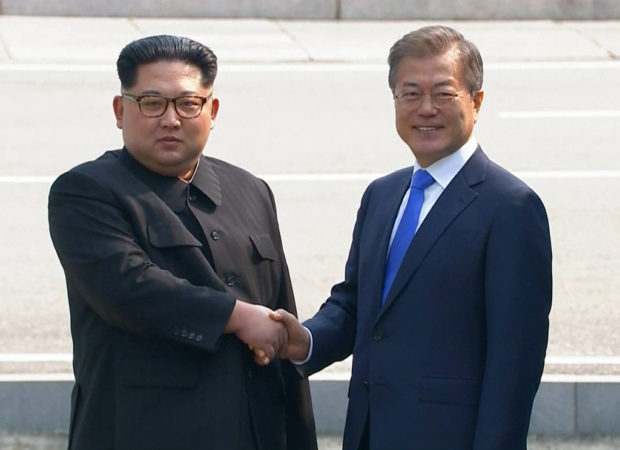North and South Korea begin historic summit

In this image taken from video provided by Korea Broadcasting System (KBS) on Friday, April 27, 2018, North Korean leader Kim Jong Un (left) shakes hands with South Korean President Moon Jae-in (right) as Kim crossed the border into South Korea for their historic face-to-face talks, in Panmunjom. Their discussions will be expected to focus on whether the North can be persuaded to give up its nuclear bombs.(Korea Broadcasting System via AP)
North Korean leader Kim Jong Un and South Korean President Moon Jae-in sat down to a historic summit on Friday after shaking hands over the Military Demarcation Line that divides their countries in a gesture laden with symbolism.
“I am happy to meet you,” a smiling Moon told Kim before the visitor stepped over the concrete blocks, making him the first North Korean leader to set foot in South Korea since the Korean War ended in an armistice 65 years ago.
At Kim’s invitation, the two men briefly crossed hand-in-hand into the North side before walking to the Peace House building on the South side in the truce village of Panmunjom for the summit – only the third of its kind since hostilities ceased in 1953.
“I came here determined to send a starting signal at the threshold of a new history,” Kim told Moon as the meeting began, promising a “frank, serious and honest mindset”.
With the North’s atomic arsenal high on the agenda, Moon responded that he hoped they would reach “a bold agreement so that we may give a big gift to the whole Korean people and the people who want peace”.
Kim was flanked by his sister and close adviser Kim Yo Jong, and the North’s head of inter-Korean relations while Moon was accompanied by his spy chief and chief of staff.
It is the highest-level encounter yet in a whirlwind of nuclear diplomacy, and intended to pave the way for a much-anticipated encounter between Kim and United States President Donald Trump.
The North’s official KCNA news agency said that Kim would “open-heartedly discuss… all the issues arising in improving inter-Korean relations and achieving peace, prosperity and reunification of the Korean peninsula”.
It did not mention denuclearization.
Last year, Pyongyang carried out its sixth nuclear blast, by far its most powerful to date, and launched missiles capable of reaching the US mainland.
Its actions sent tensions soaring as Kim and Trump traded personal insults as well as threats of war.
Moon seized on the South’s Winter Olympics as an opportunity to broker a dialogue between them, and has said his meeting with Kim will serve to set up the summit between Pyongyang and Washington.
The White House said in a statement it hoped the summit would “achieve progress toward a future of peace and prosperity for the entire Korean Peninsula”.
Trump has demanded the North give up its weapons, and Washington is pressing for it to do so in a complete, verifiable, and irreversible way.
But Seoul played down expectations on Thursday, saying the North’s technological advances with its nuclear and missile programs meant any deal would be “fundamentally different in nature from denuclearization agreements in 1990s and early 2000s”.
“That’s what makes this summit all the more difficult,” the chief of the South’s presidential secretariat Im Jong-seok told reporters.
Peace and denuclearization
Pyongyang is demanding as yet unspecified security guarantees to discuss its arsenal.
When Kim visited the North’s key backer Beijing last month in only his first foreign trip as leader, China’s official Xinhua news agency cited him saying that the issue could be resolved, as long as Seoul and Washington take “progressive and synchronous measures for the realization of peace”.
In the past, North Korean support for denuclearization of the “Korean peninsula” has been code for the removal of US troops from the South and the end of its nuclear umbrella over its security ally — prospects unthinkable in Washington.
“The big issues we know are peace and denuclearization,” Yonsei University professor John Delury told AFP.
The two Koreas “can do a lot more on peace than on denuclearization”, he said, but the post-summit statement will give “a lot of chance to analyze every word, reading between the lines, look for things that are there and not there”.
Pyongyang announced last week a moratorium on nuclear tests and intercontinental ballistic missiles, adding it would dismantle its Punggye-ri nuclear test site.
But it also said it had completed the development of its weapons and had no need for further tests.
Seoul has also promoted the idea of opening talks towards a peace treaty to formally end the 1950-53 Korean War, when hostilities stopped with a ceasefire, leaving the neighbors technically in a state of conflict.
Reunions of families left divided by the war could also be discussed at the summit, and Moon has told Japanese Prime Minister Shinzo Abe he will raise the emotive subject of Japanese citizens kidnapped by the North.
The North Koreans were expected to cross back to their side for lunch, and before the afternoon session, Moon and Kim were to engage in a symbolic tree planting ceremony on the demarcation line.
The soil will come from Mount Paektu, on the North’s border with China, and Mount Halla, on the South’s southern island of Jeju.
After they sign an agreement, a joint statement will be issued with a banquet and farewell ceremony to follow in the evening before Kim returns to the North. /kga














